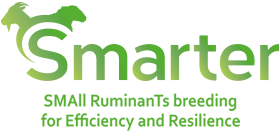
This project has received funding from the European Union’s Horizon 2020 research and innovation programme under grant agreement No 772787.
EAAP invited review paper Livestock disease resilience: from individual to herd level
– by A. Doeschl-Wilson et al.
Infectious diseases are a major threat to the sustainable production of small ruminants and other livestock species. Control efforts, such as vaccination or breeding approaches often target improvements to individual resilience to infections, i.e. they strengthen an animal’s ability to cope with infection, rather than preventing infection per se. There is increasing evidence for the contribution of non-clinical carriers (animals that become infected and are infectious but do not develop clinical signs) to the overall health and production of livestock populations for a wide range of infectious diseases. Therefore, we strongly advocate a shift of focus from increasing the disease resilience of individual animals to herd disease resilience as the appropriate target for sustainable disease control in livestock. Herd disease resilience not only captures the direct effects of vaccination or host genetics on the health and production performance of individuals, but also the indirect effects on the environmental pathogen load that herd members are exposed to. For diseases primarily caused by infectious pathogens shed by herd members, these indirect effects on herd resilience are mediated both by individual susceptibility to infection and by characteristics (magnitude of infectiousness, duration of infectious period) that influence pathogen shedding from infected individuals. There may be trade-off between these different traits that need to be considered in the context of herd-resilience.
This paper reviews what is currently known about how vaccination and selective breeding affect herd disease resilience and its underlying components, and outline the changes required for improvement. To this purpose, it also seeks to clarify and harmonise the terminology used in the different animal science disciplines to facilitate future collaborative approaches to infectious disease control in livestock. The paper concludes that vaccination and breeding programmes that target improvement of herd disease resilience will lead to more effective control of many infectious diseases in production animals, as they not only reduce the impact of infectious pathogens on the health and production performance of individuals, but also on pathogen transmission.
The review paper has been published in the EAAP commissioned special issue “Sustainable livestock systems for high-producing animals”, in the journal Animal Vol. 15, Issue 7, July 2021: Doeschl-Wilson, A., Knap, P. W., Opriessnig, T. & More. “Livestock disease resilience: from individual to herd level”, Animal 100286, https://doi.org/10.1016/j.animal.2021.100286. The review contributes to Smarter WP3 (trade-offs) and WP6.

